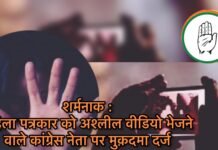
Hindu nationalism, a potent force in Indian politics, has found a fertile breeding ground in the vast digital universe of echo social media. Algorithms catering to confirmation bias, targeted misinformation campaigns, and a potent mix of religious fervor and nationalism are fueling the rise of online communities with increasingly polarized views.
Amplifying Voices, Echoing Sentiments:
Social media platforms, designed to connect individuals, have unwittingly become echo chambers for Hindu nationalist groups. Algorithms personalize content based on user interaction, creating insular online spaces where every post reinforces pre-existing beliefs. This creates a self-perpetuating cycle, feeding users a steady stream of content that fuels their fears, validates their biases, and demonizes “others,” often religious minorities or dissenting voices within the Hindu community itself.
Weaponizing Information, Distorting Reality:
Misinformation masquerading as truth thrives on social media. Fake news and doctored videos targeting minorities or portraying a Hindu India under threat from internal and external enemies circulate at lightning speed. The emotional potency of religious iconography and manipulated narratives, often amplified by anonymous accounts and bots, bypasses critical thinking and ignites feelings of anger and resentment. This creates a hostile online environment where dissent is silenced and violence, both virtual and real, becomes normalized.
Saffron Surge: From Likes to Votes:
The online mobilization of Hindu nationalist sentiment has real-world consequences. Social media campaigns galvanize supporters, orchestrate offline protests, and influence voters. The Bharatiya Janata Party (BJP), led by Prime Minister Narendra Modi, has been particularly adept at harnessing the power of social media, using it to build a loyal online base and disseminate its agenda. This digital outreach helps translate online support into electoral victories, further emboldening Hindu nationalist rhetoric and policies.
Beyond Algorithms: A Call for Critical Engagement:
The rise of Hindu nationalism on social media raises serious concerns about the erosion of social harmony, the suppression of dissent, and the potential for offline violence. However, it is crucial to remember that not all Hindus endorse these views. There are vibrant online communities actively countering hate speech, promoting secularism, and advocating for marginalized voices within the Hindu fold.
The way forward lies in critical engagement with online content, fact-checking information, and amplifying diverse voices. Social media platforms must be held accountable for curbing hate speech and misinformation. Users must actively resist confirmation bias and seek out alternative viewpoints. Only through informed discourse and responsible digital citizenship can we ensure that social media does not become a tool for division, but a platform for understanding and promoting a more inclusive India.
This article aims to present a balanced perspective on the complex issue of Hindu nationalism on social media. Please remember that this is a sensitive topic with diverse viewpoints, and further research and critical engagement are essential to understand its nuances and implications.






[…] भाजपा के हाल ही में हुए राष्ट्रीय अधिवेशन में पारित एक प्रस्ताव ने देशभर में चर्चा छेड़ दी है। प्रस्ताव में अयोध्या में राम मंदिर निर्माण को आगामी 1000 वर्षों के लिए भारत में “रामराज्य” की स्थापना के संकेत के रूप में दर्शाया गया है। इस प्रस्ताव पर विभिन्न तरह की प्रतिक्रियाएं सामने आई हैं और इसे राजनीतिक, सामाजिक और धार्मिक दृष्टिकोणों से परखा जा रहा है। […]